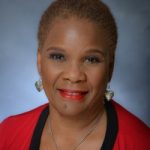Brenda Jackson believes in love, and (like your editors here at Bookish!) she also believes in the importance of diversity. Her romance novels speak to these twin passions, by combining them beautifully on the page.Forged in Desire, her latest release and the first in her Protectors series, is the perfect example of this. Here, Jackson tells Bookish readers about her own realizations about the importance of diversity in romance novels.
I can clearly recall when I became hooked on romance novels. I was introduced to Kathleen E. Woodiwiss by a coworker in the early 1990s, and my love of historical romance novels started there. I read all of Woodiwiss’ novels. My favorite hero was Brandon Birmingham from A Flame and the Hour. I named my youngest son Brandon after this hero.
It was only when I shifted from reading historical to contemporary romance that I found something different. Namely, none of the main characters in the novels looked like me. Two things bothered me: the lack of diversity in contemporary romance novels, and the stereotyping of certain cultures when they were present. When black Americans were described, which was rarely, they were all domestic help. I figured authors were writing about what little they knew about other cultures. I was proven right when I began attending conferences and discussing the lack of diversity in books with my contemporaries.
What some authors were failing to see was that the United States was no longer a melting pot, where you put all cultures into a pot and the result is one homogenous culture. In the 80s, this country began evolving into a huge salad bowl. You retained those distinct qualities of who you were, culturally and individually. When you were mixed together, those differences enhanced the salad. No one lost their identity. It became important for me to write my love stories using the concept of a salad bowl versus a melting pot.
I also strongly believe that a true romantic will want to read a love story regardless of race or culture. Of course, you will find some who prefer reading about people who look, think, and act like them. But I believe most have no problem exploring and expanding their horizons. My books tell beautiful love stories between two people who happen to be black Americans. They love just like anyone else and are faced with some of the same challenges. And I make sure people who read my books see that very few people of one race don’t have friends of another. Personally, I have just as many close white friends as I do black.
I write about the world I enjoy reading about; those are the stories I love to tell. These are men and women who are successful, upper middle class. They might have started with nothing but through hard work and dedication they now own huge tracts of land, Fortune 500 companies, and aeronautic firms. My hero and heroines are a part of American society just like anyone else. They belong, and I make sure they have a place in romance. When I began writing many years ago, I was told by several editors that there was no such thing as “black love.” I proved them wrong with my own personal love story as well as with the love stories I continue to write.
Brenda Jackson is the New York Times and USA TODAY bestselling author of over 100 novels and novellas, including two that have been turned into films—One Special Moment and Truly Everlasting. Brenda is a recipient of the Romance Writers of America’s Lifetime Achievement Award and an NAACP Image Award nominee for Outstanding Literary Fiction for her book, A Silken Thread. Jacksonis an advocate for diversity in romance and was the first African American author to make both the USA TODAY and New York Times bestseller lists in series/category romance genre. You can visit her at BrendaJackson.net.
REPRINTED WITH PERMISSION FROM BOOKISH.COM




 The Importance of Diversity in Romance Novels
The Importance of Diversity in Romance Novels



